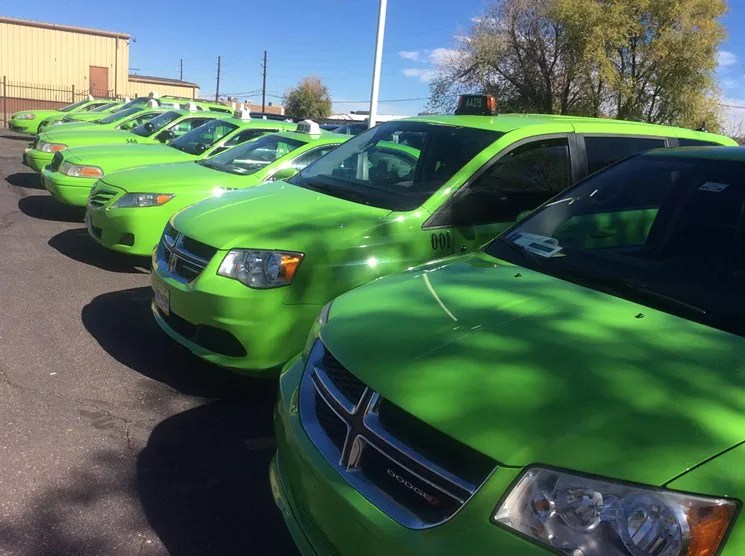
Abdi Buni

Audio By Carbonatix
Denver International Airport has reached a decision that will ease taxi congestion and level the playing field for Denver cabbies vying for airport fares.
Starting April 1, each of the seven licensed cab companies in Denver will receive 36 airport permits, regardless of fleet size. The new rule will reduce the number of total taxi permits from 321 to 252 – a change made because of the dwindling demand for taxis thanks to the ever-increasing popularity of ride-share companies like Uber and Lyft.
To accommodate the growing passenger demand for ride-share cars, their current lot, located within the Commercial Vehicle Holding Lot, will be moved to a corner of the Mt. Elbert Shuttle Lot, roughly doubling the number of available spaces to 320. The new lot will open on Tuesday, February 21, says DIA spokesman Heath Montgomery.
The move will also ease inbound traffic on Peña Boulevard, as the surge of ride-share drivers trying to get into the current lot has created major backups and raised safety concerns.
“That lot that we’ve established out there – it gets overwhelmed really fast,” Montgomery says. “By moving them out by Mt. Elbert, we’re going to solve that traffic issue and that safety issue, and we’re going to provide more space for them to operate, because again, their number of operations has gone up dramatically while taxis’ has gone down.”
The decision regarding taxi permits is a win for Abdi Buni, the president of Green Taxi, whose company previously

Abdi Buni, owner of Green Taxi.
Abdi Buni
had only twenty permits. But it could be considered a loss for companies like Metro Taxi, which previously had 97 airport permits.
The more permits each company has, the more chances drivers have to get airport fares. The massive cultural shift from taxis to ride-share cars makes these rides even more important for cab drivers hoping to make a decent wage.
Montgomery says it’s become difficult to gauge each company’s market presence since the Public Utilities Commission’s recent decision to remove fleet-sized limits entirely. Permits used to be issued according to each company’s capped fleet size.
“You’re back to the challenges that we had with the PUC change in model, because we used to have a solution to that,” he says. “We would give 5 percent of the permits to the company that had 5 percent of the market share. We can’t do that anymore, so really, there’s no good solution there. The most equitable thing we can think of is to just give everybody who’s licensed by the PUC and wants to operate [at the] airport an equal number of permits, and that’s what we’re going to do.”
Montgomery says the new taxi rules were decided upon after analyzing passenger demand and soliciting ideas from taxi companies.
“We’ve gone back and forth and had conversations with these operators about what they think would be a fair way to do this. One of the things that we heard from multiple people was, why don’t you just make it even among everybody?,” he continues. “My perspective on this is that our ultimate goal is to make sure that we’re providing a high level of reliable taxi service to the passengers who want to use taxis. It does nobody any good to have a hundred or 200 or 300 extra taxis sitting in our lot for hours on end, because they’re not making any money, our passengers aren’t using them, [and] our infrastructure becomes strained from all the people waiting. It just really doesn’t help anybody.”
Despite the lessening demand for cabs, new taxi companies hoping to break into the market will be able to work the airport. Montgomery says that twice a year – once in January and once in July – the permits will be evenly redistributed if there are new cab companies licensed by the PUC. Even without new companies being formed, the permits could shift at any time; if it turns out that a company doesn’t want 36 permits or can’t put them to use with their current fleet, the excess permits will be evenly distributed among the other companies.
The new system is temporary, Montgomery says, but it won’t be changed anytime soon. In the future, the airport may consider a longer-term contract with one or more companies, something that is likely to give DIA the regulatory power to tailor and fine-tune airport taxi service to its liking.
For now, Green Taxi president Buni is happy with the outcome. He no longer has to ease his driver’s concerns about getting to the airport, because the days of them being outnumbered by the bigger companies will be over April 1.
“I think now it is fair,” he says. “The little one was not left behind and the bigger guy was not left behind. It is all fair.”